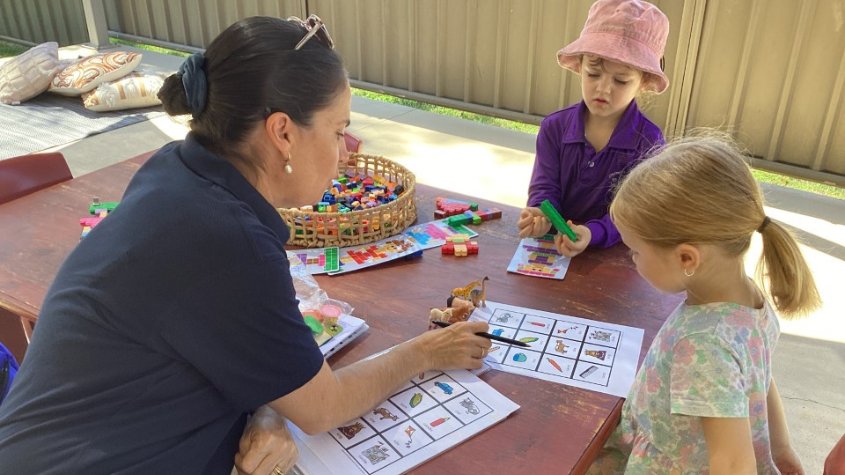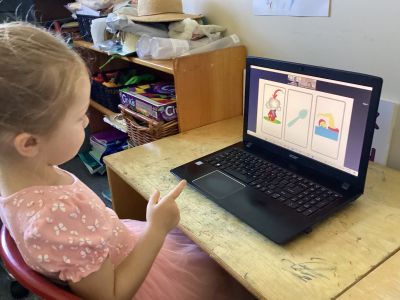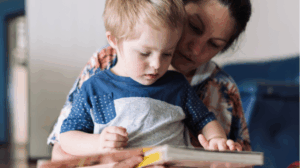Speech therapy at kindy changes everything for Peggy
Access to speech therapy at her daycare centre has transformed life for Peggy. Now she can communicate on a par with her peers and has a much stronger foundation for her transition to school.

The support she’s received has changed everything for her. Now her confidence is amazing.”
“I hate to imagine where Peggy would be, if she hadn’t received this help,” says Bec, mother of four-year-old Peggy.
“It’s so good knowing that she’ll go into prep next year at the level that other kids are at. Without access to the speech therapy sessions through kindy, she would have suffered across the board to socialise, to play, her language and then her education.”
Earlier this year, Peggy completed a year’s program of speech therapy with the Royal Far West (RFW) speech pathologist, referred and facilitated by the Clermont Kindergarten Daycare that she was attending.
Now she can communicate on a par with her peers. This wasn’t the case a year earlier.
“When she first came to the centre, Peggy couldn’t join in play and interact with other children because no one could understand what she was saying,” explains Katie Harrop, educator at the Clermont Kindergarten Daycare which Peggy attends.
SVA advocates for a national, early childhood development policy framework and service system that provides high-quality integrated supports in the form of Early Childhood Hubs to children experiencing socio-economic vulnerability from birth to six-years-old.
“The support she’s received has changed everything for her. Now her confidence is amazing.”
Katie, Peggy’s educator, picked up the speech and language difficulties that her family hadn’t clocked.
Growing up on a cattle station, Peggy had had no access to mainstream services and had mixed very little with other children. After an initial assessment and referral from RFW at the centre, specialists found that Peggy had fluid in her inner ear. After treatment, she was able to hear much better and could develop her language skills.
RFW provided zoom sessions every fortnight, with an in-person visit from the speech pathologist half-way through the year – all at the centre.
RFW works with a cluster of three kindergartens in Clermont, Springvale and Collinsville, about 400km inland from Rockhampton in Queensland. The towns service the coal mines and agricultural properties in the region so socio-economic status varies. However access to services is hard.

SVA research, conducted with Mitchell Institute and Deloitte Access Economics, has identified communities across Australia with high levels of early childhood disadvantage and a lack of early childhood education and care services. Rural and regional communities are overrepresented in this data including the location of this cluster of kindergartens.
Providing allied services in an integrated way, accessible to the children at the centre has multiple benefits including building educators’ knowledge and awareness of the role of allied health in helping children. This enables both the centre and the family to support the child’s progress and achieve better outcomes for the child.
Being a consistent person, year-on-year, means that I have a good relationship with the educator and with the kids who I can support in their transition to school.”
Katie says I’ve learned a lot about speech and articulation. “And I’m more confident to work with the children. Having seen what Karla [the speech pathologist] is working on with them, I can step in and model it.”
“I’m also better at identifying potential concerns and can easily refer a child for support.”
Having inhouse allied health workers also allows the practitioners and educators to build up trust with each other and with the children.
“Being a consistent person, year-on-year, means that I have a good relationship with the educator and with the kids who I can support in their transition to school,” says senior speech pathologist, Karla Mulherin from RFW.
After each telehealth session Karla sends an email to the educator and the child’s family explaining the different things they’ve worked on and what they can do, to support that child.
And for a working mum like Bec, to have this service provided in such an integrated way within the centre is invaluable.
“Peggy being able to access speech therapy while she’s at kindy was a massive help.”
Bec also appreciates how integrated and smooth the process was.
“As they’re playing, Katie flags when it’s time. They come in for 20 mins or half an hour and off they go and don’t know any different.”
Without these services, children starting school are already behind; they wouldn’t stand a chance academically.”
It means children can access services in a safe, familiar environment without needing to attend a separate clinic and miss out on education and time with their peers. This has been shown to achieve better results with their therapy.
“Without these services, children starting school are already behind; they wouldn’t stand a chance academically,” says Katie.
Clermont Kindergarten currently has five children doing speech therapy each week and one doing occupational therapy. Two families access some psychological support.
“There is a two-year waiting list for any allied health in that region,” says Royal Far West, CEO, Jacqueline Emery.
“The organisation’s interventions have shown positive outcomes, including improved developmental outcomes for the children and enhanced capacity of early educators.”
“We have monitored these three areas compared to a community with a similar demographic and their data from previous Australia Early Development Censuses,” explains Jacqui. “And the areas that we’ve worked with have had a really significant positive shift in outcomes.”
Bec recently saw some videos of Peggy talking and was amazed how far she has come.
“I hate to imagine what would have happened if we hadn’t got onto it when we did. Her education isn’t going to be left behind and we won’t be playing catch up in years to come.”
SVA’s work is strengthening advocacy for a national approach to scaling Early Childhood Hubs so that more children are able to benefit from integrated models.
*Not their real names
About Royal Far West
Royal Far West (RFW) provides holistic, multidisciplinary early childhood intervention services for children in rural and remote areas, addressing complex developmental and health challenges so that they can reach their full potential.
RFW addresses critical shortages in children’s allied health services in regional and remote areas. The organisation, established in 1924, provides services for children aged up to 12 via telecare and through community outreach in 364 rural communities across four states. Services are provided primarily to children in their kindergarten or schools as well as residential programs at RFW’s facilities in Manly.
The multidisciplinary teams consist of paediatric clinicians, including psychiatrists, paediatricians, psychologists, speech pathologists, occupational therapists and other allied health professionals.
Only 30% of their work is with children under five. The rest of their work is in schools.
A lack of Early Childhood Education and Care services in regional and remote locations means many under five children are not accessing early learning and developmental delays are not being picked up before starting school.
Data shows that children living in very remote areas are up to twice as likely to start school developmentally vulnerable compared to their urban peers, with 190,000 children identified by RFW in remote areas as being at risk.
Local mining company Glencore funds RFW to provide services in the cluster.
About SVA’s Early Years work
SVA knows that the current system of support for young children and families is fragmented and lacks integration, making it difficult for families to access the resources they need. We believe all children should be able to access high-quality early childhood education and care, regardless of where they live or the challenges their family is facing.
Early intervention can break cycles of disadvantage, leading to better lifelong outcomes for individuals and communities.
SVA tackles these systemic challenges by addressing the root causes and improving equitable access to high-quality, evidence-based, integrated services in early childhood.








